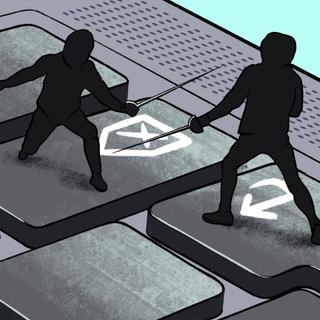"It's devastating, the worst I've ever seen," "a free-for-all brawl," and "it has taken on enormous proportions." These are the ways some of the Wikipedia contributors interviewed by Le Monde described the conflict that has been rocking the French-language version of the online encyclopedia for several weeks. Most wished to remain anonymous, a sign – among other things – of the "nasty atmosphere" they described.
The source of the conflict lies in a debate over the "deadnames" – or morinoms in French – of trans people. Should these names that are no longer in use, such as birthnames, be mentioned on Wikipedia? If so, in which cases and under what conditions? On the English-language version, contributors settled the matter back in 2015, without too much controversy: They agreed to only mention the deadnames of people who became famous under that name. However, among French-speaking Wikipedians, the question has remained unanswered, and even resurfaces regularly.
In 2022, it had already caused quite a stir within the community. An op-ed – signed by 40 prominent figures, including Paul B. Preciado and Virginie Despentes – was even published in weekly magazine L'Obs. The text criticized "Wikipedia's treatment of trans, non-binary and intersex people," citing, among other things, the use of deadnames. "Disclosing the deadnames of trans people against their will exposes them to plausible harassment, discrimination, physical and moral violence."
At the time, lengthy discussions on Wikipedia had led to a series of recommendations concerning the biographies of trans people, such as the use of the pronoun or pronouns they use to refer to themselves. However, it didn't clearly settle the issue of deadnames.
Encyclopedic or harmful information?
Tempers flared once again in January, 2024. "For almost two years now, I've thought that this kind of consideration should be decided by community vote across the board," said one contributor, with frustration.
So, on January 29, a project to survey contributors was set in motion. "That's what set things off," one Wikipedian (we'll call her Anne) said to Le Monde. "Preparing the survey proved chaotic, as the factions tried to phrase the questions in line with the answers they wanted." After many delays, this consultation was eventually launched on February 12.
On one side, those in favor of including deadnames in articles asserted that it represents "encyclopedic information of major interest," at least in biographies of people who had achieved significant renown under that name. The other side's argument was grounded in a Wikipedia principle governing the writing of biographies of living persons: "Do no harm." "As I see it, that's the priority," a contributor with nearly a decade of experience, nicknamed Nattes à chat and defining themselves as non-binary, told Le Monde. "If using someone's old name makes them suicidal, I don't see why we'd do that – it's private information! What matters is what that person has done."
You have 61.6% of this article left to read. The rest is for subscribers only.
